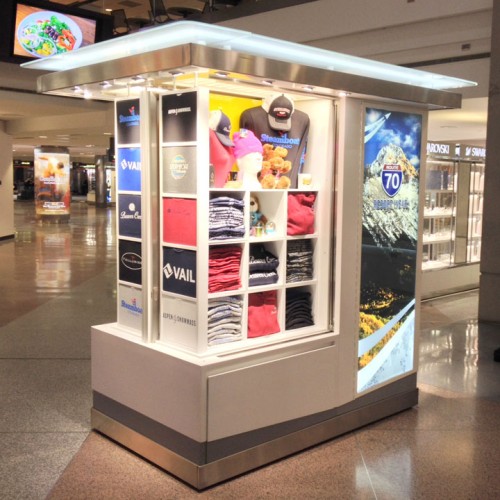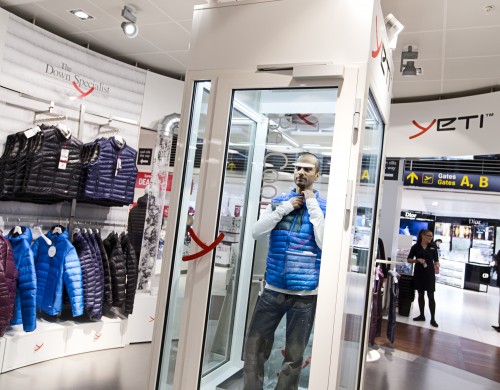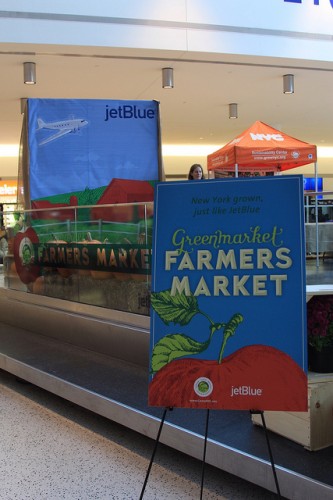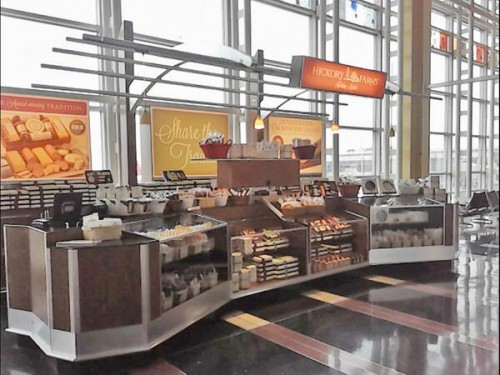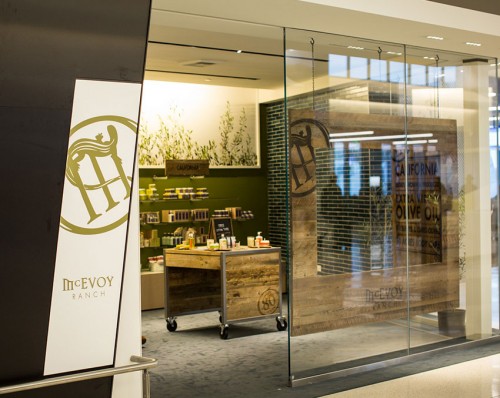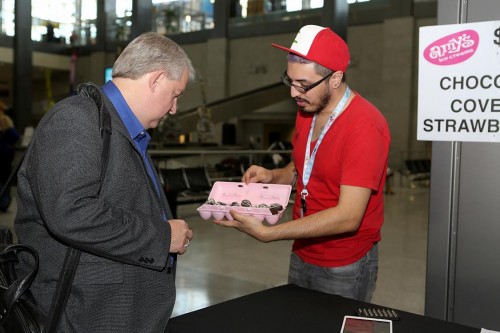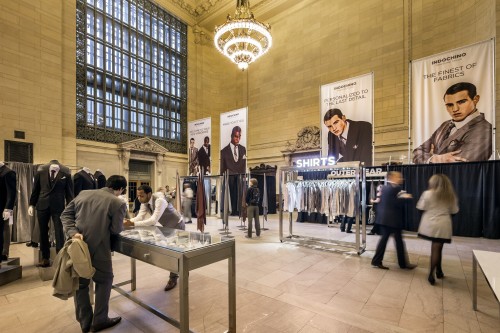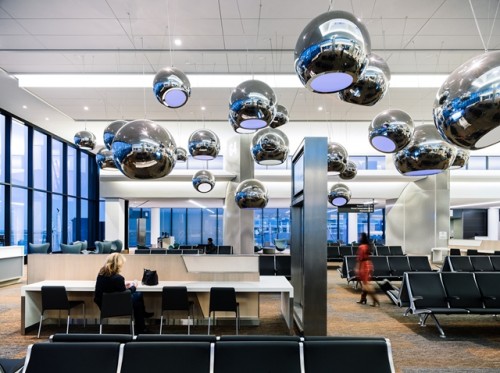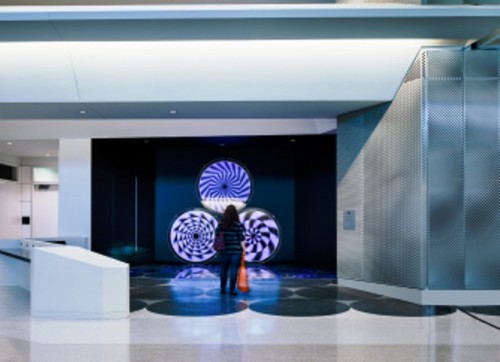They’ve worked well in malls and on upscale shopping streets. Now pop-up retail shops and restaurants are becoming more common in airports.
For London’s Heathrow Airport, pop-ups offer the ability to provide “seasonality and variety to passengers and the opportunity to test new concepts and brands,” said Hazel Catterall, Heathrow’s head of fashion.
In addition to frozen yogurt in the summer, artisan chocolate at Easter, flip-flops and sandals during the summer and specialty gifts in the spring, “we introduce relevant popups to match the travel theme such as ‘BBC Doctor Who’ products during the program anniversary to coincide with the summer holidays,” said Iona Harper, Heathrow’s experience delivery manager.
Copenhagen Airport has hosted pop-up restaurants, where top Danish chefs took turns serving special tasting menus from an open kitchen. And every few months a different company creates a pop-up in the “Brand Box” in the airport’s main tax-free shop. Right now outdoor clothing and gear company, Yeti, is in the CPH brand box with a special fitting room offering customers a place to try on down jackets at icy cold winter temperatures.
Airports in the United States are hopping on the pop-up bandwagon as well.
In October 2013, JetBlue hosted a three-day Farmers Market in T5 at JFK International Airport. “That was such a successful pop-up experience that we’re now looking at how we can integrate it more on a regular basis,” said JetBlue spokeswoman Tamara Young.
During this past holiday season, Hickory Farms tested the idea of a Holiday Market shop at Ronald Reagan Washington National Airport. In the Delta Terminal of LaGuardia Airport in New York, the eco-friendly lifestyle and fashion website Zady set up a pop-up shop selling jewelry, accessories, handbags, clothing and home goods.
“From a business standpoint, it’s a great idea,” said Ramon Lo, editorial director of Airport Revenue News. “Short-term leases can give vendors a chance to dip their toes into the airport arena and build awareness for street-side locations,” while allowing airports to vet new operators and, often, fill unused spaces, he said.
This past January, when San Francisco International Airport reopened United’s renovated Terminal 3, Boarding Area E, two spaces for pop-up shops with year-long leases were included alongside new restaurants and retailers that will be there much longer.
“We wanted to provide new, small business owners an opportunity to operate at SFO without the cost of an expensive build out,” said airport spokesman Doug Yakel. “If the shops are successful, they can propose on another space at the airport in the future. If they are not successful, at least they don’t have huge bills to pay going forward.”
For the next year, the work of local and regional artists will be on view at SFO in the Collector pop-up, while organic olive oil, skin care products and other items will be sold at the pop-up shop operated by Marin County-based McEvoy Ranch.
While the shop has been open less than a month, “we’re experiencing fast-paced growth,” said McEvoy Ranch co-proprietor Nion McEvoy. “With upwards of 20 new flights slated to be added by the airline in March, we’re confident that sales will continue to increase.”
Temporary retail stores selling Broncos and Seahawks memorabilia did very well this year at Denver and Seattle International airports, as did the Hudson News pop-up shops at Newark Liberty International Airport during Super Bowl week.
It can often take some negotiation with airports to secure the space for pop-ups, “but airports are motivated and sometimes ask for these pop-ups because they of course share in the benefit of the sales,” said Hudson Group spokeswoman Laura Samuels.
Increased sales for an existing tenant – and the desire to help out local lovebirds – is why Austin Bergstrom International Airport makes room in the bag claim around Valentine’s Day for Amy’s Ice Creams to set up a low-tech pop-up shop (a cloth-covered table with a cash box, chairs and a cooler) selling chocolate truffles and pink egg cartons filled with chocolate-covered strawberries.
“The airport doesn’t charge extra for this or other any pop-up,” said airports spokesman Jason Zielinski. “We receive a set percentage of total sales for all concession operations, so an increase in sales generated by pop-ups also produces an increase in revenue for the airport.”
At Denver International Airport, a Retail Merchandising Unit (RMU) cart and kiosk program in place since September 2011 offers 38 spots that often function as pop-ups.
The program offers entrepreneurs and small business owners agreements that last from three months to a year and most go to Denver or Colorado-based concepts that have featured everything from solar-powered accessories and emergency supplies to jewelry, vitamins and handmade candy and chocolates.
“Some stay on and get new agreements, but usually a third if not half will turn over on an annual basis,” said Deborah Kravitz, owner of program operator Provenzano Resources.
Route 70 Resort Wear, which sells branded T-shirts and sweatshirts from Denver-area ski resorts along Route 70 for at least six months, is the newest kiosk to open at Denver International Airport. And any day now, Pink Slip, a shop selling boutique and brand-name boxers and T-shirts for men and tights, stockings and other “basics” for women, will open for five months at LaGuardia Airport’s Terminal B, in the space formerly occupied by Brookstone.
“This will help us get a read on if this is something travelers want without us having to go into the investment of a longer term lease,” said shop co-owner and airport concessions consultant Ellery Plowman of Elleco. And because Pink Slip is renting the space in the gap between two long-term tenants, the airport gets a bit of extra revenue “and passengers see something new, unique and cool” instead of an empty space, said Plowman.
One company eyeing JFK, Heathrow and other hub airports as possible pop-up venues is Vancouver-based Indochino, an on-line custom clothing company for men that has a Traveling Tailor program.
“We had great success at our event in Grand Central Station with the kind of men who appreciate the convenience of a 30-minute appointment that results in a custom wardrobe,” said Kyle Vucko, Indochino co-founder and CEO. “And an airport pop-up store could resonate in the same way.”
(My story about airport pop-up shops first appeared on USA TODAY in my February 2014 ‘At the Airport’ column.)
